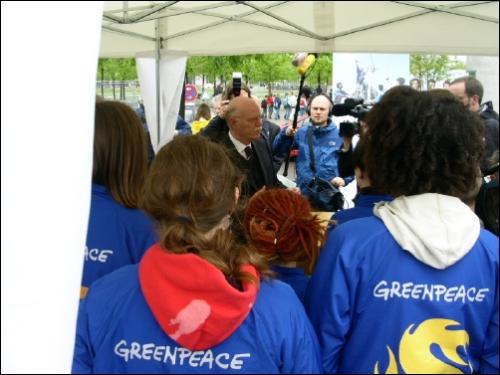 finally, reports the guardian:
finally, reports the guardian:(...) Australia won applause at the start of UN-led climate change talks in Bali on Monday by agreeing to ratify the Kyoto protocol, isolating the US as the only developed nation outside the pact.
Soon after an Australian delegate promised immediate action on Kyoto, the new prime minister in Canberra, Kevin Rudd, took the oath of office and signed the ratification documents, ending his country's long-held opposition to the global climate agreement (...)
this took place in the framework of the bali climate conference (3 - 14 december 2007). the guardian offers extensive reporting on the meeting.
 berichtet heute zeit online:
berichtet heute zeit online:(...) Demokratie ist langsam. Das liegt nicht nur an der Bürokratie, auch nicht so sehr an den Politikern oder den Juristen. Der Hauptgrund für die strukturelle Langsamkeit der Demokratie ist, dass bei wichtigen Entscheidungen fast alle Individuen und Interessengruppen gehört werden müssen. Langsamkeit ist also eine Folge von Rücksichtnahme und Respekt. Beim Klima jedoch ist – vor allem, weil zu lange zu wenig getan wurde – höchster Zeitdruck entstanden. Innerhalb von vier Jahrzehnten den Ausstoß von Kohlendioxid um 80 Prozent reduzieren zu müssen, das ist unter demokratischen Bedingungen kein Pappenstil. Im Grunde müsste die richtige Klimapolitik durchgepeitscht werden. Aber die Peitsche ist in der Demokratie eben kein besonders wirkungsvolles Instrument (...)
sollte man/frau da nicht besser auf die vermeintliche schnelligkeit, effizienz und innovationsfreudigkeit des marktes setzen? das fragt sich in diesem zusammenhang the nation:
(...) The Bush Administration, still roadblocking firm caps on emissions, wants to let the market solve the crisis. "We're on the threshold of dramatic technological breakthroughs," Bush assured the world last January, adding, "We'll leave it to the market to decide the mix of fuels that most effectively and efficiently meet this goal." The idea that capitalism can save us from climate catastrophe has powerful appeal. It gives politicians an excuse to subsidize corporations rather than regulate them, and it neatly avoids a discussion about how the core market logic of endless growth landed us here in the first place (...)


